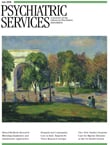To better understand the impact of schizophrenia, the National Alliance on Mental Illness (NAMI) commissioned a survey of attitudes and awareness among the general adult public and among individuals living with the illness and their caregivers. More than two million Americans live with the illness—about twice the number of Americans living with HIV-AIDS. Research has shown that only a third of individuals who have schizophrenia receive treatment, and about half of those treated can improve significantly or recover completely over time.
The survey results are presented in an 18-page report, Schizophrenia: Public Attitudes, Personal Needs. A primary finding is that public knowledge about schizophrenia is low; only a fourth of those surveyed considered themselves to be familiar with the illness. In a list of 11 common medical conditions, only Lou Gehrig's disease and multiple sclerosis ranked lower than schizophrenia in understanding. However, 85% of public respondents knew that it is a medical illness and that treatment can help people with the disorder live independent lives (79%).
Public attitudes toward individuals with schizophrenia differed depending on whether or not the individual is in treatment. For example, 77% would feel uncomfortable working with a person who has not received treatment, whereas 23% would feel this way if the person were in treatment. When asked whether they would be afraid for their safety around a person with schizophrenia, the corresponding proportions were 71% and 21% in terms of whether the person had received treatment.
Harris Interactive conducted the survey in February 2008 via its Harris Poll Online (HPOL) Research Panel, a database that consists of several million people who have agreed to participate in online research projects. A total of 1,012 HPOL respondents, 258 people living with schizophrenia who were in treatment, and 256 caregivers completed the survey, which averaged about 17 minutes. Demographic weighting was used to ensure that the data reflect the national population of adult U.S. citizens. Propensity score weighting adjusted for respondents' propensity to be online. Data for the caregivers and individuals living with schizophrenia were not weighted.
People living with schizophrenia reported difficulty getting health care for physical conditions. Nearly half (49%) said that doctors took their medical problems less seriously once they learned of their diagnosis. Nearly all said that access to a psychiatrist (95%), and medication and treatment (96%) are most helpful to improving their condition. Most believed that more effective treatments (93%) and better private health insurance (85%) would help improve their condition. Most reported that access to housing (88%), having a job (76%), and transportation (72%) would help improve their condition.
Among the caregivers surveyed most reported challenges in accessing basic health services (82%) and specialized services (79%) for their family member. Seventy-one percent believe that the condition of the person in their care would improve if caregivers received respite care.
The survey report concludes with several recommendations for improving public knowledge about schizophrenia and the lives of people with the illness. It is available on the NAMI Web site at www.nami.org/ schizophreniasurvey.

